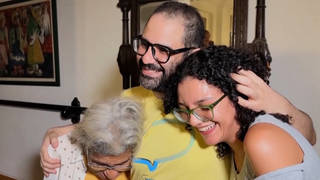
As the holy month of Ramadan begins, the Egyptian army has deployed tanks and troops in Cairo’s Tahrir Square, firing shots in the air to disperse the remaining pro-democracy protesters who have been occupying the square for three weeks in protest against the slow pace of reform after the popular uprising ousted former president Hosni Mubarak. According to witnesses, security personnel stormed the area from several directions, smashing tents and stalls before taking some protesters into military detention. Meanwhile, the trial of Mubarak on charges including corruption and murder is set to open tomorrow at Cairo’s Police Academy. We go to Cairo for an update from Democracy Now! correspondent Sharif Abdel Kouddous. [includes rush transcript]
Transcript
AMY GOODMAN: We turn now to what’s happening in Egypt. As the holy month of Ramadan begins, the Egyptian army has deployed tanks and troops in Cairo’s Tahrir Square yesterday, firing shots in the air to disperse the remaining pro-democracy protesters who have been occupying the square for the last three weeks in protest against the slow pace of reform. According to the witnesses, security personnel stormed the area from several directions, smashing tents and stalls before taking some protesters into military detention.
Meanwhile, the trial of ousted Egyptian President Hosni Mubarak is set to open Wednesday at Cairo’s Police Academy. Authorities say the venue was shifted from a Cairo convention center at the last minute for security reasons. The head of Cairo’s criminal court said over the weekend that the trial will be televised live on the air.
For more, we go directly to Cairo to Democracy Now! correspondent Sharif Abdel Kouddous.
Sharif, you were there in Tahrir Square yesterday. What has happened?
SHARIF ABDEL KOUDDOUS: Well, Amy, for the third time since the fall of President Hosni Mubarak, the military has forcibly broken up a protest in Tahrir Square. As you described, it was the first day of Ramadan. Many people were fasting. Hundreds of military police, Central Security Forces, uniformed police officers and plainclothes police officers holding machine guns, truncheons, stormed the square, backed by armored vehicles. They ripped up tents. They destroyed any remnants of the three-week encampment that’s been there since July 8th. Soldiers beat protesters with truncheons. They destroyed vendors’ carts in the streets. More than 150 people were injured. Up to 270 were arrested, as people who were filming nearby with their cell phones or journalists with their cameras reportedly had them confiscated or destroyed. At least one BBC journalist has been arrested. And while this was happening, many bystanders were cheering, cheering the army on and cheering the Security Forces’ clampdown on. They were pointing out different protesters in the crowd and surrounding them. Some were getting beaten and then handed over to military police.
The context in which all of this is happening is that over the past couple of weeks, the Supreme Council has used a lot of the same rhetoric that the Mubarak regime did to demonize protesters, accusing them of being infiltrated by foreign agents, accusing them of being spies. The Supreme Council members have been appearing on state television in interviews and doing this. At one point they even accused the April 6 Youth Movement, which was one of the key groups in organizing the revolution, of being—of trying to drive a wedge between the people and the military. And so, this is the context under which this all came under, and this really helped to incite violence against the protesters.
Now, it must be said, the number of people at the sit-in in Tahrir had decreased significantly. It was only a few hundred who were staging a sit-in at the square. This came after 29 political groups and movements decided to leave the square for Ramadan. A few member—families of martyrs who were killed in the revolution decided to stay. And a number of protesters decided to stay in solidarity. They had moved their encampments, begun to move it to a smaller part of the square. There was discussions about opening the square to traffic. As all this was going on, the army came in very hard, and they used blunt force instead against the peaceful demonstration. And Tahrir has now been emptied.
And just briefly, as you mentioned, of course, the trial of Hosni Mubarak is scheduled to begin tomorrow. He faces charges of involvement in the killing of protesters and corruption charges. The big question remains, is whether he will actually show up. His sons and the former interior minister, who are being tried with him, will be driven from the prison they are being held at to this location, the Police Academy, on the outskirts of Cairo, where the trial is being held. But it’s unclear whether Mubarak will be flown from Sharm el-Sheikh. All indications point to that he should be flying in, but many doubt that we’re going to see the former president, behind bars, on trial tomorrow. It will be broadcast on live television, and everyone in Egypt will be watching.
AMY GOODMAN: Sharif Abdel Kouddous, thank you for being with us. And of course, we will continue to cover this and get reports from you, Democracy Now! correspondent in Cairo.













Media Options